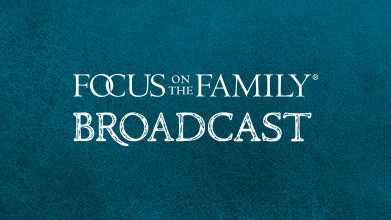Opening:
John Fuller: If you’re a man in midlife, you might be asking questions like, who am I? Where am I going? Or what is the meaning of life? And that’s not at all unusual because those questions do come up in the middle stages of life. Now, we’re going to address that today on “Focus on the Family,” with our guest Steve Arterburn. And we’re going to comma – and we’re going to come alongside and help you avoid a crisis and really thrive. Your host is Focus president and author Jim Daly, and I’m John Fuller.
Jim Daly: John, I don’t know if this qualifies for a midlife crisis. But the very morning – this morning, I was reading the book and prepping for the program with Steve today. And I had an overflow of the coffee pot. And I burnt my hand trying to fix this overflow. And I thought, “Lord, this is just like you to give me a midlife – is this a midlife problem?”
John: A kitchen disaster?
Jim: A kitchen disaster.
John: I don’t know. That could qualify.
Jim: I mean, I’m mopping it up in my hand. I burnt my hand on the coffee machine…
John: And hit your head coming up. Yeah.
Jim: Hit my head on the cabinet – and I’m going, “OK. I don’t know if this is midlife. But, man, I’m lost.” John: It’s a crisis of some sort. That’s for sure.
Jim: But I thought it was a crisis of some sort. Hey. Listen. We do want to speak to men today but also the wives who are married to hopefully these wonderful men. And both of you will learn so much from the program today. But I want to start with Scripture. And this is for all of us. But in II Timothy 3:16 and 17, it says, “All scripture is breathed out by God and profitable for teaching, for reproof, for correction and for training and righteousness that the man of God may be complete, equipped for every good work.” And I love this idea of applying that journey…
John: Mmm hmm.
Jim: …That Biblical growth that we have over our lifetime to the middle years, because so often, vocationally, we are achieving things that we wanted to achieve. Maybe you wanted to start your own business, and you did it. And – or maybe you just wanted to make a good living for your family, and you did it. And you look around and go, “OK – now what?” And that’s what we’re going to talk about with Steve today – 6 Ways For Men To Thrive In Middle Life.
Body:
Jim: Oh, is it – OK – in – OK – In Middle Life – Steve, welcome back to Focus on the Family.
Steve Arterburn: Thanks. I love being here. And I’m so glad you started that scripture, because midlife crisis does not have to occur. It really can be one of the greatest things ever. I would say it’s the least written about, though, because we know about childhood development, adolescent development. We know about old age, but very little about the developmental stages in midlife. And it really doesn’t have to be a crisis. I made up a word called Lordular and…
Jim: Lordular.
Steve: Lordular – and that is…
Jim: OK (laughter).
Steve: …Let’s – let’s go into this with Scripture as our foundation…
Jim: Yeah.
Steve: …With an eternal perspective. And let’s become that godly man that we’ve always wanted to be. And we can be that man.
Jim: So what’s the definition of what a midlife
John: Yeah.
Jim: Most people don’t realize that. Midlife probably has that same kind of feel to it.
Steve: Mmm hmm.
Steve: Mmm hmm. The thoughts about midlife started with a book that referred to it as a midlife season. And then we started talking about midlife. And it’s a transition point. And you may rarely hear anything with the word gender in it that is positive. But here’s a great two-word combination – gender expansion. Midlife, for a man, is a time of gender expansion.
Jim: You better explain that one (laughter).
Steve: Yeah. In other words, we start to feel more compassionate to other people.
Jim: Oh.
Steve: We start to desire deeper connection toward midlife. So…
Jim: Is that because we’re getting older, and we’re understanding the importance of it? Are we just…
Steve: Absolutely. I…
Jim: …Thick-skinned we or thick-headed?
Steve: No. I think a lot of men think that relationships are optional and that the achievement is everything. And so, we start to expand our own definition of who it means to be a man. Now, there’s something else about this midlife thing that happens to a lot of men that do produce a crisis. If you were raised in a family where there was no father, or a weak father and a domineering mother, you start to have this fear creep up on you that you’re going to end up in that same kind of mode. Well, rather than react to that, you need to have a plan. And that’s why this is a manual for midlife. It’s not a manual to avoid a crisis. It really is a manual to be the man God has called you to be and address the issues that might prevent you from getting there.
Jim: Well, we’re going to hit some of those. But before we do, that bigger picture – I really want to paint it for the listener. How do you believe God sees the second half of life?
Steve: Hmm.
Jim: I mean, what is he expecting from us as 40, 50, 60-something men?
Steve: Yeah. I got to tell you. I’m seeing men in the – you know, midlife is – the target is 30 to 60. That’s pretty much where you’re going to have it. And yet some people never even launched out in their 30s.
Jim: (Laughter).
Steve: But I see men starting to retire from a career and starting to minister in ways that they never had time to do. I see a lot of people doing it right. From my perspective in, Scripture, I don’t find anybody retiring from being a disciple or – well, of course, they were killed before they could get to that age. But, there’s no retirement in my mind. There’s a shift. There’s a transition. And you can be preparing for that transition at age 40, 45. And it can be the greatest time of your life. And I’ve got to tell you in this gender expansion, you also have on the other side women that are starting to feel more confident, more assertive about themselves. And the combination of the two of you expanding who you have been and really branching out – maybe that the nest is empty, and you’ve got some things you can do – that can create this abundant life that you’ve heard so much about that maybe you wondered, “Have I missed it?”
Jim: Yeah.
Steve: Now’s the time to find it.
Jim: And it can be – and I think that’s the right picture to paint here. It’s a very positive moment. It isn’t…
Steve: It is.
Jim: …Necessarily a negative moment…
Steve: No.
Jim: …Unless you paint the picture that way. Steve, in the book, you’ve summarized the changes that happen in midlife for men very well. You said, in fact, it seems as if everybody’s character in the show has changed. And nobody’s sticking to the script. The actions are not like anything we’ve rehearsed before. What were you getting at there? To me, it sounds like an expectation for life. It’s kind of moving along. There’s a certain rhythm to life that’s good. You fit with it.
Steve: Mmm hmm.
Jim: You and your wife are doing well. The kids are now probably 17, 18, 19. You’re about launch, or you’ve just recently launched. That usually is about when midlife is hitting you. What’s the change of the script? And why does that freak us out and make us panic?
Steve: Well, I think the younger our kids are the more predictable they are and the more control we have over them and the more control we have in life in general. And so, this shift of roles, we – all of a sudden, these people that we kind of predicted what they were going to do or say or be – now, they’re developing a new individuality. They’re separating from us. And we – if we don’t have some other men that we’re connected to, it can be a pretty scary experience. And so, one of the things that I say is, as you’re watching this happen, your script doesn’t apply anymore. Life changes. You need to be in a group where you can talk about this and get some insight from other guys.
Jim: OK. Let’s get down to the analysis.
Steve: OK.
Jim: Uh, the wives that are listening, for example – how do you know if your spouse – or how do you know as a husband or how do you know as the man that you’ve hit this midlife crisis moment?
Steve: Mmm hmm.
Jim: What are those signs?
Steve: Well, you know, if it’s not going well, one of the negative signs, of course, is kind of a depression, or an emptiness and a loneliness and a just wandering through.
Jim: What does that manifest like? I am thinking specifically of the wife to help her husband. So, speak to her. She’s coming to you saying, “Here’s my husband. This is what he’s doing.”
Steve: Mmm hmm.
Jim: “It’s a little different behavior than I’m used to.”
Steve: He’s shutting down.
Jim: OK.
Steve: He’s closing off to you. He’s afraid, really. I mean, that’s the basis of this. He’s afraid. He doesn’t know what he’s getting into. And so, he’s not going to walk in one day and say, you know, I’m scared to death of what’s happening. And one of the things that we have to do is learn to live with some new limitations and accept that and not be tremendously bothered every time we can’t do something that we used to do.
Jim: Do you think – does that kind of define a younger man, that limitations are only things to conquer? I mean, I…
Steve: Definitely.
Jim: I think that, you know, playing football and being…
Steve: Yeah.
Jim: …a sports guy, like I was, that was always the thing for us as guys. We’re in the huddle going, “OK. We’re going to get this first down.”
Steve: Yeah.
Jim: I mean, your whole life kind of develops in that way.
Steve: Right.
Jim: Climb the hill. Win the good job. Do the things you need to do to conquer. And then all of a sudden – OK, I don’t know if I can do that next one.
Steve: And then, there’s the other person who goes to work in a factory and does the same thing, puts the spark plug in – day after day, the same thing – so that, 20 years later, he can retire, so he can put his kids through college, so that he can provide for other people. And, you know, it – the mountain is just being consistent and continuing to do that, while all these other people look like they’re living this dream. And I feel for that guy, because he’s a hero.
Jim: Well, wouldn’t you – yeah – to me, when you say, it sounds like sacrificial manhood…
Steve: Absolutely. Great…
Jim: …If I could say it that way.
Steve: Great word – it’s humbling down into what I think Jesus calls us to do. And that’s to serve.
But I want to – I want to point out something that’s really a positive thing. In this area of limitations, when they tested 25-year-olds versus 40-year-olds, the 40-year-old is superior in verbal functioning, numerical functioning, reasoning and memory – all of those issues. The only thing that we’re not very – we suffer a little bit from is, uh, kind of a perceptual sense of something. In other words, it takes us longer to get a joke – big deal.
(LAUGHTER)
Steve: But all the other stuff…
Jim: Or to remember where your keys are (laughter).
Steve: Yes. It’s better. So, you know, we might not be able to run as fast, or whatever. But there are things that are happening that we’re really starting to peak more toward midlife than to go downhill.
Jim: Mmm hmm.
Mmm hmm. Steve, you painted a pretty broad picture of the midlife years. I’ve got a friend who’s in his mid-50s.
Steve: Mmm hmm.
John: And he’s been very faithful in working for 30 years at the same employer. And he’s got an option to retire early. What kinds of issues do they need to discuss to work through this?
Steve: Well, you know, if I was talking with him, I would encourage him absolutely to retire, but not to retire, but retread and keep rolling.
You can do about everything you ever dreamed of doing in retirement in about six months. And then…
John: Then what?
Jim: You get bored.
(LAUGHTER)
Steve: So what I would be saying to this couple is, hey, what’s the dream? And get out there and do something that you’ve never had the time to do.
John: Mm.:
Jim: And that’s great advice. In fact, you mentioned four critical things men should do in this phase. I’ll hit ’em quickly. This is where you may want to write it down, or get to the website…
John: Yeah.
Steve: Mmm hmm.
Jim: …So, you can catch ’em again. But, Steve, you said re-evaluate, recalculate, remember and reinstill. So, hit those.
Steve: OK.
Jim: What does that mean?
Steve: Well, first of all, a reflective life is a sign of a mature man. And that’s something that we’re – we’re forgetting to do. You need to reflect back. And what has gone well, and what hasn’t? And you need to remember where you’ve tripped up, or – and you need to re-evaluate some things in your life. Are you using porn? Are you drinking too much? Are you doing anything that’s hurting you? Now, you need to stop that. But, you also need to start something else, and you need to develop the character. You know, I have these people with alcohol and drug problems. And they’ll say, “I was delivered from this addiction.” And I’ll say, “Well, were you delivered into total character and Godly manhood?” “Well, no.” “OK,” so, let’s get a program.” So when – and so in this area of “recalculate,” I say join a group in that recalculation.
John: Mm.
Steve: Don’t do this alone. This is the time to get in a men’s Bible study, get into a growth group with some other men. And you’ll find that men do become men in the company of men. And you’ll discover parts of yourself that God wants to use that you’ll never discover alone, isolated and just doing what you’ve always done.
John: Mm.
Jim: That’s good. That’s the re-evaluate part. I like that challenge, actually.
Steve: Yeah.
Jim: And then you go to recalculate. What – what does that mean?
Steve: Well, if I stay with what I’m doing now, where am I going to end up? Or, if I change my trajectory, I start to really serve. I start to study the scriptures so that I can be, quote, unquote, “‘Lordular” in all of my living. Then where’s that gonna lead me? And I think men are lonely, isolated, confused. And there are these healthy, caring, loving, other – a little bit older – men that want to come alongside you and help you step into kingdom living. But it takes a little bit of a risk to do that. But when you do, when you make that recalculation and then you make the adjustment and get into it, you never look back. You say – and I had a lady the other day. She said, “He’s gone a full day serving. But I’d rather him be gone that full day, and I’ll have him six then have all seven of the guy he used to be.”
John: Mm.
Jim: Wow. I mean, that’s true. When you serve, you tend to get so much more back…
Steve: Yeah.
0:16:19: Jim: …than person or people you’re serving, which is great. So you’ve got re-evaluate, recalculate. Let’s remember and re-instill.
Steve: Possible Next Day Promo: Well, remember what – what God called you to do. And let’s re-instill some new dreams within there. Let’s remember some of the things that really made you hum when you were younger, some things that excited you, and what could you do about that to bring that dream back to life?
Jim: Steve, what about the guy who says, “You know, my head was so down and hard-charging in my career – I don’t remember hearing that from God?” What would you say to him?
Steve: Start to listen.
Jim: (Laughter) That’s good.
Steve: And so you have to turn off the motors. And you have to have the…
Jim: Be still.
Steve: Yeah. Be still. Know that He is God, and He cares about you. And this is the thing. We’ve got to – wherever we are, many times, we’re waiting for God to do God’s waiting for us to do. So, you might be waiting for God to tell you something. Well, let’s just get busy. And let’s start moving in a direction and see if God blesses that or not. And then we can adjust. But when you’re standing still, when you’re stagnant, it’s hard for God to move you.
Jim: Yeah.
Steve: It’s much easier to move when you’re moving.
Jim: I love that analogy of the sailboat, you know? If the sails aren’t up…
Steve: Yeah.
Jim: …The wind’s not going to move the ship.
Steve: That’s right.
Jim: You got to have your sails up. That’s your part. And then the Lord will bring the wind.
Steve: Well, I like to talk about laying on of hands. We all love to be part of laying on of hands. I say, lay on your – lay on the hands of a steering wheel. And get your hands on the steering wheel, and drive yourself to a Bible study, a meeting…
Jim: (Laughter).
Steve: …A growth group, a recovery group. That’s the laying on of hands that can really start to your life.
Jim: Action.
Steve: You don’t – yes. And it’s faith in action, versus faith as a concept.
Jim: And that fourth one, again, re-instill – what are you driving at?
Steve: Well, re-instill in your life the values that you were born to live out. And that’s – that’s the value of companionship, of partnership, the values of Godly living and holiness. You were called to something special. You know, John 8 – John 8:31-32 says that “If you follow my teachings, you’re truly my disciple. Then you’ll know the truth. And the truth will set you free.” Start to follow. Just memorizing a verse doesn’t set you free. But following the Bible, you start to become the disciple. And then you experience the freedom that God wants you to experience.
Jim: Mm.
John: We are talking about midlife, and specifically, how men can grow in their faith and in their mission statement for life. Obviously, as Jim said, this is for wives as well. This is a journey couples have to make together. And Steve Arterburn is our guest today. Stop by the website, and look for Steve’s book, 6 Ways For Men To Thrive In Midlife. It is an excellent little resource. And if what we were talking about a moment ago – if being quiet and listening to God is hard, this book can help. It really is an easy little read. It’s got some great content. And, we’ve got it here at focusonthefamily.com/broadcast.
Jim: Steve, in the book, you mentioned the macho man. And what are those big takeaways for men that are…
Steve: Mm hmm.
Jim: …living that kind of life?
Steve: Yeah. You know, I was overweight. And so, I called myself “Nacho Man,” but…
(LAUGHTER)
Jim: Nacho man.
Steve: But within – within all of us is – I think, every man – there’s this, uh, expectation that we can do more, conquer more, know more. We’re smarter, stronger and all of that. And OK. So that’s the extreme that’s unhealthy. But, what you want to be is not the extreme macho man. You want to become a competent man. I think every guy’s kind of asking, “Am I a man? And then, “OK. I’m a man.” But am I a competent man?
Jim: What’s the definition of that…
Steve: Well…
Jim: …If you’re doing the self-evaluation right now? The guys driving down the road listening…
Steve: You – you can…
Jim: How do you know your competent?
You can…you can do stuff, you can solve problems, you can fix things, and you can come up with creative ways to do different things. Don’t shut that down just…
Jim: Wait a second. Fixing things makes you competent? I’m in trouble (laughter).
John: No. You’ve got the right phone numbers to call.
Jim: That’s like the worst thing in my repertoire. I can fix hardly a thing.
Steve: But…
Jim: (Laughter).
Steve: …You know who to call.
Jim: OK. I do know who to call.
Steve: And there are other things, though, Jim that – obviously, you’re fixing a lot of things in people’s lives. You’re helping other people. And so, maybe that’s somebody better at putting a bookshelf together does that for you. But you’re – we are competent men. And so, don’t just abandon this fact that we are male. And it’s a pretty exciting thing to be. And we do have some competencies. Now, we want to use those to serve, not to lord it over somebody, or to abuse or control somebody. And that’s where we get in trouble. So, we want to go back to scripture where, you know, God is telling us to serve others, not to use our gifts to lord it over somebody else.
Jim: Yeah. No. That’s good. And that macho mentality – I mean, a male mentality – You’ve got to bridle that. Like Christ says, lay down your life.
Steve: It’s called restraint.
Jim: For your spouse…
Steve: Yeah.
Jim: …That’s a tough one.
Steve: It…
Jim: Think of that.
Steve: Yes. And I don’t think that – you know, we always start with Ephesians 4:22, verses 21 – because 22 says, “Woman, submit.” But 21 says, “Submit yourselves to one another.” And that’s what we want to see people do…is lay down your life the way Christ tells us to. And when you do that, you pick up a role in life that is very much like Jesus.
John: Mm.
Jim: Steve, let me hit this one, because again, if you’re around a group of men and I would think all of us men listening will acknowledge this, and some wives may be surprised by this. But the conversations usually start with, you know, what do you do?
Steve: What do you do?
Jim: Where do you work?
Steve: Right.
Jim: We don’t talk about the kids, if we’re just – you know, we’ll talk about the kids. But we don’t start the conversation there, typically.
Steve: Right.
Jim: You know, how many kids do you have? What are their ages? That’s not your usual golf-buddy discussion. It comes around that, usually because your kids are having some kind of problem, and it’s frustrating you…
Steve: Yeah.
Jim: …As a dad.
Steve: Right.
Jim: That’s how those conversations get started. But men usually begin to identify with each other by what we do.
Steve: Yeah.
Jim: Is part of this midlife crisis problem in that area of “I’m losing my identity”?
Steve: Mm.
Jim: I’m wrapped up in what I am. I’m wrapped up in my identity, because of what I do. How do we shake that noose?
Steve: You could be wrapped up in it. And it could be a very negative experience when somebody says, “What you do?” But I’d like to have folks consider a different answer. ‘What do you do?” “You know what? I work down at the auto plant during the week. But the thing I’m most excited about is I love my family. And here are some of the things that we love to do together. But when it comes to the kingdom of God, I have a ministry at the church. And this is the thing that just sets me on fire.”
Jim: So that becomes your identity?
Steve: Yeah
Jim: I mean, that’s what we’re really driving at.
Steve: It’s an expanded identity, versus talking about “you don’t like it down there – the people” – don’t – just say – just tell them where you go to work. And then, if you’ve truly accepted the challenge of midlife according to this little manual here, if you accept that challenge, you have an expanded identity. And, you know, I would just say this to women. If all you do is raise your children, the empty nest is going to kill you when it comes. So, you need to be more than – I mean, there’s nothing more valuable than a mother. But be more than a mother. Be planning for that time when they’re not there. Work on, develop skills, have your own life separate from the children and all that that entails, so you’re ready for your transition.
John: Mm.
Jim: You know, Steve, one area we really haven’t covered right at the end here – and that’s the relationship with your children. And, again, those ages are going to vary at this stage…
Steve: Yeah
Jim: …in your life as a 40, 50-something. You can have – today, more common to have younger kids even. But how do you relate to your children? Let’s just assume they’re right at the point of going off to college. Or they’re already there or vocational training. They’re out of the home. How does a father relate to his children in this moment of midlife crisis?
Steve: If you’re still into correction versus connection, you’ve got it wrong. I think a lot of us men make mistakes. We blow it. And this time is the time for repair, to take and humble yourself, ask for forgiveness. Talk about the difficulty of being a dad, those kinds of things. And you can build the relationship with the older child that maybe got messed up during those high school years.
John: That’s hard to do, though. I mean, it’s…
Jim: Are you living the dream (laughter)?
John: I’m just saying – I’m just saying, experientially, in my own life. It’s hard to kind of not offer the instructive, hey, you know, have you checked your oil on your car lately kind of thing.
Steve: I know. And we are living that. We have three, One – two in college, one in graduate school. But, we have to be there for them not offer any kind of control or judgmental or shaming kind of belittling thing, because they’ve gone into young adulthood. And the more we honor them, well, it just frees them to make the best decision – the good decision.
Jim: Yeah. And it’s got to be so intentional because I think that works out of our habits. I mean, you’ll be, I think, pleasantly surprised after I read the book. One of the things I did this morning, in fact, was – my oldest, who’s 18, is away with his buddies at a cabin up in
Steve: Mm.
Jim: …Just having some fun with his – with his friends. And I could have texted a lot of things to him. Did you read the Scripture this morning…
Steve: Yeah – right.
Jim: …You know (laughter)? But I just said, you know, I want you to know I love you. I hope you’re having a fun time. And…
Steve: Great – wow.
Jim: …I think that’s a better way to go. But…
Steve: It really is.
Jim: But, really, you’ve pushed me to do that simply by reading the book. So, thank you for that. I want to end on the – perhaps, the highest of notes. And it’s the lowest, which is humility. You talk about that in your book. You say that humility is the biggest lesson that we learn as parents. Why is it?
Steve: Well, my wife’s phrase, “humbling down,” is one of the most difficult things but one of the most rewarding things. When we come down, think of what Jesus did. All creation is His. And He comes down to our level. We don’t have quite as far to go as Jesus did in getting down eyeball-to-eyeball with us. So, we can humble ourselves, admit some limitations, some mistakes. And then, I think true humility versus humiliation is to humble yourself and become the servant that God has called you to become. Use the talents that He gave you. Don’t cover up the problems that you’ve developed.
Jim: Huh.
Steve: And tell people you’re in process, and you’re working. That’s a true humble man to say, I still – at age 65 or 70, I’ve not arrived. I’m still working.
John: Mm.
Jim: Yeah. That is good.
Steve: God is not done.
Jim: You also mentioned the idea that thriving isn’t a right. It’s a pursuit. And in rights-oriented culture, I found that very provocative. Thriving is not a right. It’s a pursuit.
Steve: It is because a lot of people think, if I just make a lot more money, if I have a little more of this or whatever, that’s thriving. But, really, thriving is the pursuit of, what has God called me to do? What is he equipped me to do? – and to live that out. You know, Jim, I think I’m one of the most fortunate people in the world, because I have a wonderful family. And I get to do what I love to do, what I started doing in seminary. I love to see people change.
Jim: Mm.
Steve: Now, what is it that lights you up and ignites your soul? That’s what you need to be pursuing, versus looking and evaluating and comparing yourself to other people.
Jim: Yeah. And you know, Steve, the bottom line is we men – and I’m sure wives are going to say, “You’re right, Jim.” We kind of need it spelled out for us sometimes, because we’re – you know, we’re locked. We’re compartmentalized in our thinking.
Steve: Yeah.
Jim: And we need the roadmap…
Steve: Right.
Jim: You know, do this, then this. In that context, there’s nothing more important for a man in midlife than to be a man of God. You’ve said that.
Steve: Yeah.
Jim: But I want you, right at the end here – describe how you believe a man of God should live his life. Give me the one, two, three, four.
Steve: Well, he’s consistent. And he’s accountable, and he has character, and he’s connected to his wife, his kids and other men. And when you compare your life to that, if you’ve got nothing of that, God is the God that can bring something out of nothing. You’re right where God wants you to be. He’s the one that brings life out of death. So, there’s great hope for you, even if all you’ve got left is nothing.
Closing:
Jim: Yeah. That is so well said, Steve. That’s why I’m excited about this resource. You know what? This is a little book. But it’s packed with great wisdom. And, Steve, you’ve done a wonderful job pulling this together for us men that need the one, two, three approach. So, thank you for that. It’s called 6 Ways for Men to Thrive in Midlife. Thanks, Steve, so much for joining us.
Steve: Thank you.
John: And, obviously, even though it’s a small book, we couldn’t cover all the points in it. And, we’re gonna suggest you get it from us here at Focus on the Family. Give us a call, if you’d like. And our number is 800 – the letter A and the word family – 800-232-6459. Or stop by focusonthefamily.com/broadcast. And as we often do we’ll send that book to you when you make a generous donation of any amount to the ministry here. We’re listener supported. We need your ongoing financial support and prayers. And so, please, donate today and get a copy of 6 Ways for Men to Thrive in Midlife.
On behalf of Jim Daly and the entire team, thanks for listening to “Focus on the Family.” I’m John Fuller inviting you back next time, as we once again help you and your family thrive in Christ.






















